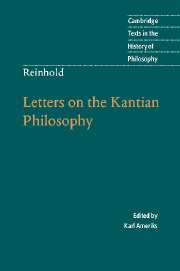Book contents
- Frontmatter
- Contents
- Preface
- Introduction
- Chronology
- Further reading
- Note on the texts and translation
- Letters on the Kantian Philosophy
- First Letter: The need for a Critique of Reason
- Second Letter: The result of the Kantian philosophy on the question of God's existence
- Third Letter: The result of the Critique of Reason concerning the necessary connection between morality and religion
- Fourth Letter: On the elements and the previous course of conviction in the basic truths of religion
- Fifth Letter: The result of the Critique of Reason concerning the future life
- Sixth Letter: Continuation of the preceding letter: The united interests of religion and morality in the clearing away of the metaphysical ground for cognition of a future life
- Seventh Letter: A sketch of a history of reason's psychological concept of a simple thinking substance
- Eighth Letter: Continuation of the preceding letter: The master key to the rational psychology of the Greeks
- Appendix: the major additions in the 1790 edition
- Index
- Cambridge texts in the history of philosophy
First Letter: The need for a Critique of Reason
Published online by Cambridge University Press: 05 June 2012
- Frontmatter
- Contents
- Preface
- Introduction
- Chronology
- Further reading
- Note on the texts and translation
- Letters on the Kantian Philosophy
- First Letter: The need for a Critique of Reason
- Second Letter: The result of the Kantian philosophy on the question of God's existence
- Third Letter: The result of the Critique of Reason concerning the necessary connection between morality and religion
- Fourth Letter: On the elements and the previous course of conviction in the basic truths of religion
- Fifth Letter: The result of the Critique of Reason concerning the future life
- Sixth Letter: Continuation of the preceding letter: The united interests of religion and morality in the clearing away of the metaphysical ground for cognition of a future life
- Seventh Letter: A sketch of a history of reason's psychological concept of a simple thinking substance
- Eighth Letter: Continuation of the preceding letter: The master key to the rational psychology of the Greeks
- Appendix: the major additions in the 1790 edition
- Index
- Cambridge texts in the history of philosophy
Summary
So you continue to insist on the opinion, dear friend, that the enlightenment of our German fatherland has been waning in Protestant domains ever since it began rising in Catholic domains? Given the comparison you drew, I wonder whether you have, on the one hand, taken into account a truly greater swiftness that has diminished since its initial zeal and, on the other, an apparent slowness that is based on an optical illusion. Has not this slowness become more prominent the further the enlightenment, much like the sun, advances in relation to its horizon? – But, according to your own assurance, you have compared the course of Protestantism only to itself and have found that it is not, for instance, merely moving forward more slowly [100] but rather that it is actually at the point of retreating. Given the perspective in which you were able to arrange them in your letter, the many facts on which you base this claim certainly offer no comforting view of the future; and I confess to you that I have not found one among them I could deny or even call into doubt. By deriving the plausibility of your claim more from the combined effect of your reasons than from the force of any one taken individually, you anticipate the objections I could make against many of the inferences you have drawn.
- Type
- Chapter
- Information
- Reinhold: Letters on the Kantian Philosophy , pp. 1 - 17Publisher: Cambridge University PressPrint publication year: 2006



